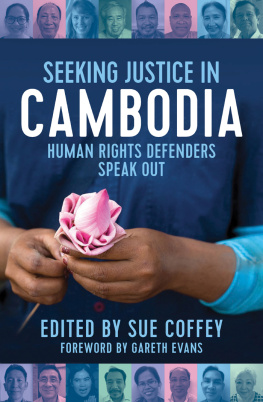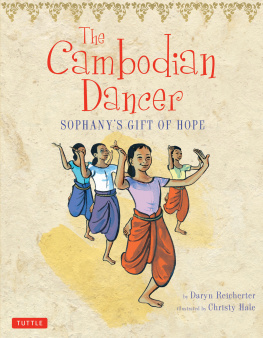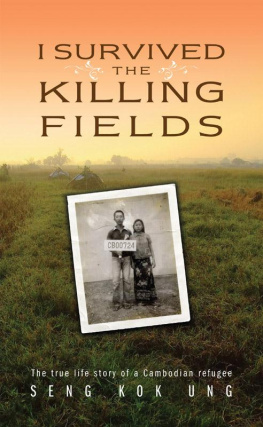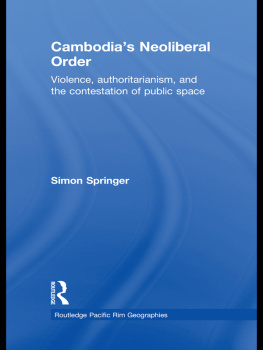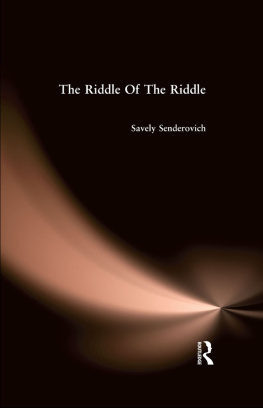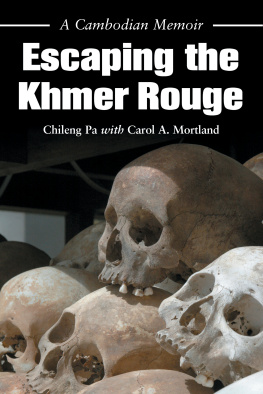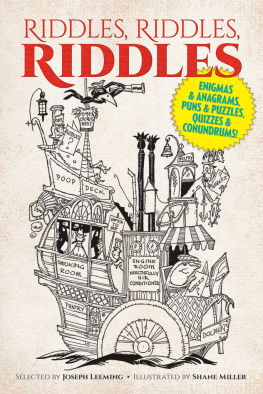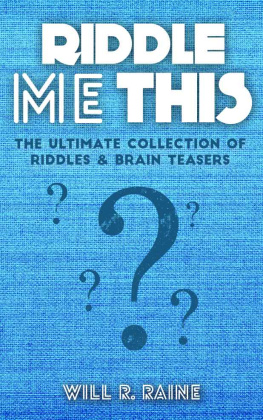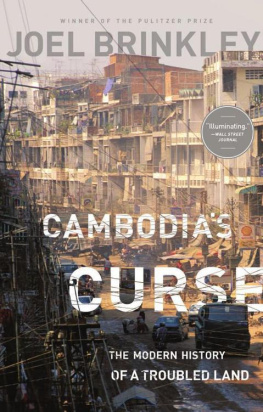CAMBODIA
AND THE YEAR OF
UNTAC:
LIFE AND LOVE IN CAMBODIAS 1993 ELECTION
ESSENTIAL ESSAYS SERIES 67
CAMBODIA
and the Year of
UNTAC
Life and Love in Cambodias 1993 Election
Tom Riddle
former UNTAC Computer Liaison Officer
TORONTOBUFFALOLANCASTER (U.K.) 2017
Copyright 2017, Tom Riddle and Guernica Editions Inc.
All rights reserved. The use of any part of this publication, reproduced, transmitted in any form or by any means, electronic, mechanical, photocopying, recording or otherwise stored in a retrieval system, without the prior consent of the publisher is an infringement of the copyright law.
Please note: A previous version of this book,
originally entitled Cambodian Interlude,
was published in 1997 by Orchid Press.
Michael Mirolla, general editor
Cover design: Allen Jomoc Jr.
Cover image: Tom Riddle
Interior design: Jill Ronsley, Sun Editing & Book Design
Guernica Editions Inc.
1569 Heritage Way, Oakville, (ON), Canada L6M 2Z7
2250 Military Road, Tonawanda, N.Y. 14150-6000 U.S.A.
www.guernicaeditions.com
Distributors:
University of Toronto Press Distribution,
5201 Dufferin Street, Toronto (ON), Canada M3H 5T8
Gazelle Book Services, White Cross Mills, High Town, Lancaster LA1 4XS U.K.
High Town, Lancaster LA1 4XS U.K.
Second edition.
Printed in Canada.
Legal Deposit First Quarter
Library of Congress Catalog Card Number: 2016952731
Library and Archives Canada Cataloguing in Publication
Riddle, Tom
[Cambodian interlude]
Cambodia and the year of UNTAC : life and love in
Cambodias 1993 election / Tom Riddle. -- Second edition.
(Essential essays series ; 67)
Revision of: Cambodian interlude : inside the United Nations
1993 election / Tom Riddle. -- Bangkok : White Orchid Press, 1997.
Includes bibliographical references.
Issued in print and electronic formats.
ISBN 978-1-77183-183-3 (paperback).--ISBN 978-1-77183-184-0 (epub).--ISBN 978-1-77183-185-7 (mobi)
1. United Nations. Transitional Authority in Cambodia.
2. Elections--Cambodia. 3. Cambodia--Politics and government--1975-. I. Title. II. Titre: Cambodian interlude III. Series: Essential essays series (Toronto, Ont.) ; 67
| DS554.8.R53 2017 | 959.604 | C2016-905968-5
C2016-905969-3 |
Dedicated to the families of
Ty Sary
Hang Vicheth
Lay Sok Phiep
Atsuhito Nakata
Members of the UNTAC Electoral Component killed in the line
of duty
and
to the expatriate men and women
of the non-governmental organizations of Cambodia
CONTENTS
ACKNOWLEDGMENTS
UNTACs Electoral Component had a bi-weekly newsletter, Free Choice. The staff of Free Choice, Leah Melnick, Sara Colm, Deborah Hopper, Gitaka Noyes, Niphat Taptagaporn, and Johnathan Stromseth, kept everyone informed, even if it meant scaring them, about what was going on in Cambodia. I used their newsletter, along with the anonymous handouts and fact sheets that the UN gave to the staff, to double check the events described here. Three Cambodians wrote me from Cambodia to clarify and verify certain points. I promised them anonymity, but I want to acknowledge their help. Mrs. Thidarat Nakkyo, a Khmer-speaking Thai who worked with UNTAC, helped with Khmer pronunciation.
This book was written in Panat Nikhom, Thailand, immediately after I left Cambodia. On the second floor of my three-dollar-a-night hotel lived the only other foreign resident, Terry Underhill. By chance, he was a former technical writer from England. As the first person to read the book, he made many helpful suggestions. Copy editing was done by James Eckardt and Bret Thorn of Manager Magazine and by Dr. Bill Berg, whom I first met during his Fulbright Lectureship in the university where I was a lecturer in anthropology. David Portnoy, who spent two years photographing Cambodia, opened up his picture library to me. And Hong Kong-based photographer John Westhrop gave permission to reprint his photograph of traffic in Phnom Penh. The picture earlier appeared in the Phnom Penh Post.
I alone am to blame for any inaccuracies in the historical or personal events described herein. However, except for a few name changes, this is the way it was.
INTRODUCTION
I arrived in Cambodia on Saturday, March 22, 1992, and left sixteen months later on Sunday, July 25, 1993. I came only a week after the United Nations Transitional Authority officially began work, and stayed until the first soldiers departed two months after the UN-supervised election. I arrived when wearing a UN cap still put you at the head of the queue, and before the locals began manufacturing them in their sweat shops and selling them in the market. I arrived when the Cambodian people still believed that the UN was going to end their nightmare by bringing peace to their country.
Things were then, as they always would be, a horrible mess. Nevertheless, everyone believed it was a less horrible mess than that made by Pol Pot and his Khmer Rouge during their experiment in communal living from April 1975 to early 1979. The Pol Pot years had left a million people dead in what had been a picturesque country of eight million nestled between Thailand, Vietnam, Laos, and the Gulf of Thailand.
In the early 80s I worked as a teacher in the refugee camps of Southeast Asia. In my classes I met a few of the hundred thousand Khmer, as Cambodians like to call themselves, who were on their way to the U.S.A. I liked them and thought that someday I would like to visit their country, then occupied by the Vietnamese army and isolated from the international community. In 1989, I picked up a masters degree in anthropology from the University of Hawaii, but dropped out when faced with getting a Ph.D. Two years later, I was hanging around Hawaii, waiting for my future to crystallize, and still hoped to one day visit Cambodia.
Then, in October, 1991, the television news reported that, after years of negotiations and the withdrawal of the Vietnamese troops, a Comprehensive Political Settlement of the Cambodia Conflict had been signed in Paris. Under the terms of the settlement, better known as The Paris Peace Agreement, the UN was going to virtually govern Cambodia until elections could be held and a new government put in place. It was to be the biggest operation in the history of the United Nations.
A couple months later I telephoned the United Nations Volunteers to ask for an application. I knew that the UNVs were the Peace Corps of the UN and if anyone would go into the heart of darkness it would be them. I told the UNV desk officer that I was only interested in Cambodia. She told me to forget itthe last thing Cambodia needed was an anthropologist. I applied anyway, but somehow never managed to complete the letters of reference or other details.
One night a few weeks later a woman from Geneva telephoned me in Honolulu.
Can I speak to a Mr. Thomas?
This is Mr. Thomas.
Blah blah blah when do you want to go to Cambodia?
Tomorrow.
We need someone who can go right away.
I said tomorrow.
The language classes have already begun with the first group of Volunteers, so we want to get you in as soon as possible.


